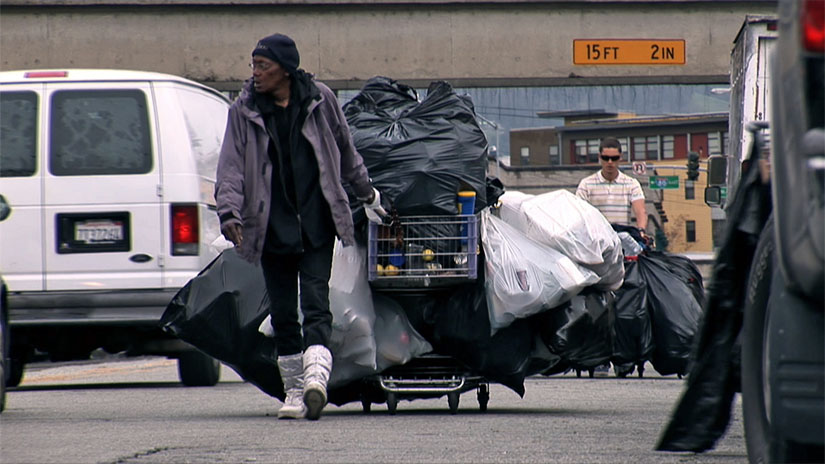by John Lightfoot
The first time I read the funding proposal for a documentary film about West Oakland recyclers Miss Kay, Landon, and Jason, I knew that the project was unique. As with the best documentary films, it promised to take us on a deep experiential dive into a place many of us don’t often get to go, allowing us to meet a community of individuals we often only see in passing and rarely, if ever, get to know on a first-name basis.
But most importantly, unlike many film proposals that start with bold pronouncements and broad assumptions, the proposal for Dogtown Redemption instead posed insightful, thoughtful questions about history, class, and poverty, and why some have access to economic opportunity and others don’t. Though seemingly straightforward on paper, in reality — and in stark clarity in West Oakland’s Dogtown neighborhood — these questions raised profoundly complex and deeply embedded systemic issues far beyond the ability of any single documentary film to possibly solve.
What the filmmakers could do, however, is show those of us who haven’t had to collect cans and scrap metal to buy food, and don’t have to sleep in a makeshift tent alongside Interstate 680, what life is like for those who do. It’s a difficult and complicated portrait of a community undergoing dramatic change, but Dogtown Redemption makes those abstract questions about history, class, and poverty in the proposal deeply personal.
Despite persistent debate about objectivity in documentary, in reality what we see as viewers is precisely what the filmmaker wants us to see. In this case, we see a cross-section of life in West Oakland through the uniquely compassionate eyes of Amir Soltani and Chihiro Wimbush. Through them, we not only learn the first names of the recyclers, but we care about them, root for them, celebrate their successes, and mourn their losses.
At California Humanities, we support work that deepens knowledge and understanding of important, timely issues affecting our communities and state. The greater promise of documentary, however, is that with the right combination of storyteller and subject, the potential is there to set in motion a transformative chain of events that begins with the realignment of individual perspective, sometimes dramatically.
We might see what we had previously taken for granted with new insight, or feel for the first time just how hard it must be to be sick, hungry, or in mourning, or struggling with addiction, or whatever it might be, if you’re pushing an overloaded cart filled with others’ cast-off trash through city streets in order to survive at a less-than-subsistence level.

In the end, the deeper purpose of a film like Dogtown Redemption is to challenge all of us to see the humanity of others, regardless of who they are, how they live, or what someone else has told us to believe about them.
And it all starts with the seemingly simple, though increasingly uncommon and therefore radical act of asking questions. This is the work of filmmakers who approach the world with curiosity and an openness of mind, and who ask more questions than they have reached conclusions.
With Amir and Chihiro, it was clear that when they first encountered the homelessness and poverty in West Oakland, their impulse was not to shy away, or rush to judgment, or take it for granted, as so many of us might; but instead to see it with fresh eyes and ask why is it this way here, with so much wealth and opportunity in the Bay Area? How can it be this way?
And to be clear, the question is not just about the recyclers, but about all of us.
This too may be beyond the scope of any one documentary film or filmmaker, but by even just considering the questions with an openness of mind and then thinking differently about people like Miss Kay, Landon, and Jason and what they have to do to survive, we might get that much closer to an answer.
John Lightfoot manages the California Documentary Project at California Humanities, a grant program for film, radio and media.
